 Int'l Snow Sculpture Art Expo in Harbin
Int'l Snow Sculpture Art Expo in Harbin Sichuan money wall for dividend payment
Sichuan money wall for dividend payment Li Na crashes Belinda Bencic in 2nd round at Australian Open
Li Na crashes Belinda Bencic in 2nd round at Australian Open
 Shocking moments when PLA's weapons open fire
Shocking moments when PLA's weapons open fire Famous Lanzhou beef noodles
Famous Lanzhou beef noodles Armed Police hold anti-terrorism drill in SE China's Xiamen
Armed Police hold anti-terrorism drill in SE China's Xiamen Harbin Int'l Ice and Snow Festival opens
Harbin Int'l Ice and Snow Festival opens 'Jin' named the word of the year by cross-strait netizens
'Jin' named the word of the year by cross-strait netizens Chinese scientific expedition goes to build new Antarctica station
Chinese scientific expedition goes to build new Antarctica station
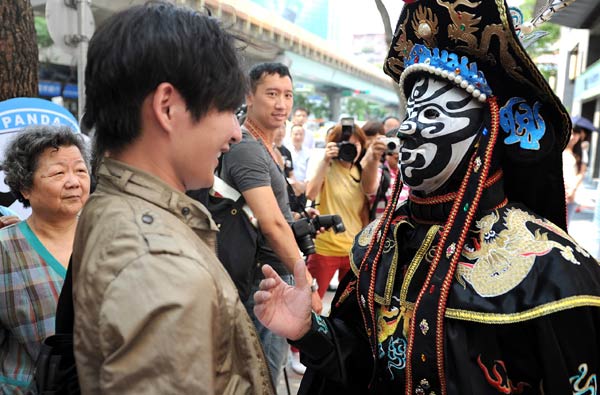 |
| A face-changing artist in Taipei performs for tourists at a Chengdu Municipal Tourism Administration event to promote the city's folk customs in July. In face-changing performances, artists repeatedly quickly change the masks they are wearing. (Source: Tao Ming / China Daily) |
BEIJING, Jan. 20 -- Businessman Josh Lin has always found it difficult to buy a ticket to fly from Shanghai to his hometown in Taiwan during the Spring Festival holiday.
Lin, 38, who works in finance in Shanghai, says he always tries to buy an air ticket as early as September, more than four months ahead of the Spring Festival — which starts this year on Jan 31, the New Year's Day of China's lunar calendar.
"More Taiwan people are working on the mainland, and more mainland tourists are traveling to Taiwan during the New Year's break," says Lin, who has been working on the mainland for seven and a half years.
The travel should be easier this year, with many extra flights planned during the festival.
The mainland and Taiwan have agreed not to set any limits on the number of cross-Straits flights added during the Spring Festival to deal with the travel peak, said Fan Liqing, spokeswoman for the Taiwan Affairs Office of the State Council.
Airlines based in the mainland and Taiwan are set to operate 105 extra flights each during the period out of Shanghai Pudong International Airport. This will be more than double the figure from the previous year, Fan told a news conference on Dec 11.
Direct air and sea transport and postal services between the mainland and Taiwan were opened on Dec 15, 2008. Previously, all such services had to be routed through a third place.
The direct flights ended a stalemate across the Taiwan Straits that started in 1949, when the Kuomintang army, led by Chiang Kai-shek, was defeated by the Communist Party of China, resulting in the founding of the People's Republic of China.
For Bennie Chen, who was born and raised in Taiwan, the mainland used to exist only in her parents' stories. Her parents moved to Taiwan in 1949, but all their relatives stayed on the mainland. Chen has been visiting them every year for the past two decades.
To visit Shanghai for the first time in 1993, she had to change flights at Hong Kong, and the whole journey took almost a full day.
The distance between Taipei and Shanghai has been shorter since 2008, when both sides approved direct flights. Chen, who is a chief operating officer at a boutique hotel in Shanghai, says the direct flights take only two hours.
The mainland authorities have been continuously boosting cross-Straits ties since the CPC elected its new leadership in November 2012.
On Feb 25, Xi Jinping, general secretary of the CPC Central Committee, met a visiting Taiwan delegation led by Lien Chan, honorary chairman of the Kuomintang.
"If brothers are of the same mind, their sharpness can cut through metal," Xi told Lien.
In April 2005, Lien, who was then KMT chairman, led a delegation to the mainland at the invitation of the CPC Central Committee. It was the first time in 60 years that leaders of the CPC and KMT had met and shook hands.
Hu Youqing, former president of the Jiangsu Provincial Association of Taiwan Compatriots, said that the cross-Straits relationship has developed steadily since the mainland elected its new leaders.
"Some of my Taiwan friends expressed worries last year since they were unclear about the cross-Straits policies of the mainland's new leaders, but they are reassured now," he says.
The mainland authorities' anti-graft efforts have also won the hearts of many Taiwan businesspeople who have invested in mainland cities, he says.
Chen Deming, president of the mainland's Association for Relations Across the Taiwan Straits, met a visiting delegation headed by Lin Join-sane, chairman of the Taiwan-based Straits Exchange Foundation, on June 20, and the two sides signed a service trade agreement the next day.
According to the agreement, the mainland will open 80 service sectors, including those related to commerce, telecoms, construction and health, in Taiwan, while Taiwan will open 64 sectors to the mainland.
The mainland and Taiwan have signed 19 trade and economic agreements since 2008, including the Economic Cooperation Framework Agreement, a pact signed in 2010 to reduce tariffs and commercial barriers between the two sides.
Flights between the mainland and Taiwan have increased from 616 to 670 a week since August, according to a supplementary agreement on cross-Straits air transportion.
The mainland is currently the largest source of tourists to Taiwan, while the island is the third-largest source of visitors to the mainland, according to Xinhua News Agency.
At a meeting with Vincent Siew, honorary chairman of the Taiwan-based Cross-Straits Common Market Foundation, in Bali on Oct 6, Xi said he hoped for a resolution of cross-Straits political disputes.
These disputes could be gradually resolved, and problems should not be handed down to later generations, Xi said.
Yang Yi, spokesman for the Taiwan Affairs Office, said on Sept 25 during a regular news briefing, that the mainland will support and encourage people-to-people political dialogue between the two sides.
Such dialogue can explore solutions to issues in politics, defense and foreign relations, and can create conditions and gather experience for the opening of cross-Straits political negotiations, he said.
In October, the first cross-Straits Peace Forum was held in Shanghai, during which scholars and former government officials from the mainland and Taiwan gathered to discuss political and security issues, a move seen as the first test of an official political dialogue.
Lin, the Taiwan businessman working in Shanghai, quotes a Chinese saying to express his confidence in the bright future of the cross-Straits relationship.
"When water flows, a channel is formed," he says.
"I am not a fan of politics. But if there is anything I really care about, I hope there will be long-lasting peace, easier communication and good economies on both sides."
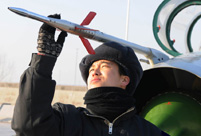 Su-30 fighter formation taking off for training
Su-30 fighter formation taking off for training 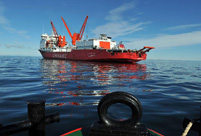 Xuelong carries on mission after breaking from floes
Xuelong carries on mission after breaking from floes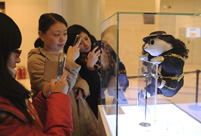 Charity exhibition raises money for panda protection
Charity exhibition raises money for panda protection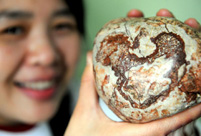 'Map of China' on the stone
'Map of China' on the stone 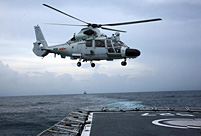 Chinese naval escort taskforce repels 4 suspicious vessels
Chinese naval escort taskforce repels 4 suspicious vessels World's weekly photos (1.6-1.12)
World's weekly photos (1.6-1.12) Li Na crashes Belinda Bencic in 2nd round at Australian Open
Li Na crashes Belinda Bencic in 2nd round at Australian Open Weekly sports photos
Weekly sports photos China's national pole dancing to play 'The Butterfly Love'
China's national pole dancing to play 'The Butterfly Love'  The never-ending Silk Road
The never-ending Silk Road  Spring Festival travel rush: One window, one world
Spring Festival travel rush: One window, one world Int'l Snow Sculpture Art Expo in Harbin
Int'l Snow Sculpture Art Expo in Harbin China photographs internal structure of water molecule
China photographs internal structure of water molecule 'Predator' makes proposal to girlfriend
'Predator' makes proposal to girlfriend Thousands of fish frozen on Norway sea
Thousands of fish frozen on Norway seaDay|Week|Month